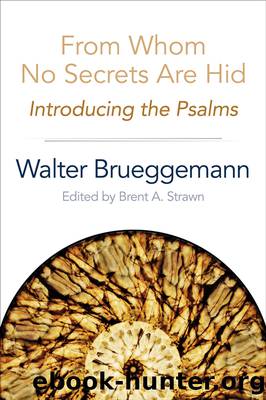From Whom No Secrets Are Hid by Walter Brueggemann

Author:Walter Brueggemann
Language: eng
Format: epub
ISBN: 9781611645262
Publisher: Westminster John Knox Press
The psalmist prays that his assailants be excluded and negated, even as they have negated him and made his life socially unbearable. The âwish listâ is that the enemy should receive in equal measure for the ways in which the enemy has abused the speaker, a kind of unforgiving quid pro quo. Having given full vent to his rage, this speaker is suddenly able, in an abrupt turn, to anticipate, giving praise and thanks to God (v. 30), who hears and does not despise (v. 33). This turn is especially important, because it evidences that when the secret of hate is fully aired, it can be relinquished. The psalmist can now redirect his passion from the enemy to ponder Godâs goodness, once he has been heard and had his venom honored.
We never read these verses in church and not without reason. The question could well be asked: Should we say such things in public? But the real question behind that question is, Should we feel such things? And the answer is that yes, of course! Yes we doânot all the time, and not all of us at the same time. But enough of us enough of the time to indicate that we should consider these articulations carefully. When we sense the need for retaliation, should we say it? Because if we say it, we challenge the veneer of cultural propriety. But if we do not say what is real to us, then the rage goes unacknowledged and unanswered, and it continues its unnoticed destructive force in our lives and in the lives of our neighbors.
It is of great importance to notice that the speaker does not purpose to enact such retaliation himself. He is powerless (and perhaps unwilling) to do so. But because the character of God is real and lively for him, he is content to entrust such unresolved hatred to God; then he can move on to praise and gladness. The psalm is a script for unburdening negation in Godâs presence. It is a script for rehabilitation to the community of praise and thanks.
It is instructive that parts of Psalm 69 figure prominently in the story of Jesus. Psalm 69:4, to âbe hated without cause,â is perhaps reiterated in John 7:7; 15:18, 24. Jesus was hated by the world in the way that this psalmist was hated. In verse 9 of the psalm, the speaker has âzeal for your house,â a note expressed about Jesus in John 2:17, where Jesus speaks of raising up the temple. Most of all, the notion of âpoison and vinegarâ is echoed in Matt. 27:34â48; Mark 15:36; Luke 23:36; and John 19:29. It is clear that the Gospel writers have Psalm 69 in purview as they portray Jesus as the innocent sufferer who suffered quite alone because of his devotion to God.
It is noteworthy that the Gospelsâ use of Psalm 69 does not voice the parts of the psalm that express a wish for ferocious retaliation. This could be taken as suggesting that Jesus has moved beyond any such wishes to forgiveness of his enemies, as in Luke 23:34.
Download
This site does not store any files on its server. We only index and link to content provided by other sites. Please contact the content providers to delete copyright contents if any and email us, we'll remove relevant links or contents immediately.
The Five People You Meet in Heaven by Mitch Albom(2853)
Name Book, The: Over 10,000 Names--Their Meanings, Origins, and Spiritual Significance by Astoria Dorothy(2500)
Real Sex by Lauren F. Winner(2487)
The Holy Spirit by Billy Graham(2433)
The Secret Power of Speaking God's Word by Joyce Meyer(2264)
0041152001443424520 .pdf by Unknown(2230)
How The Mind Works by Steven Pinker(2228)
ESV Study Bible by Crossway(2146)
Ancient Worlds by Michael Scott(2113)
The Meaning of the Library by unknow(2078)
The Gnostic Gospels by Pagels Elaine(2039)
Churchill by Paul Johnson(2019)
MOSES THE EGYPTIAN by Jan Assmann(1981)
The ESV Study Bible by Crossway Bibles(1964)
Jesus by Paul Johnson(1895)
Ancient Near Eastern Thought and the Old Testament by John H. Walton(1857)
The Nativity by Geza Vermes(1855)
The Complete Dead Sea Scrolls in English (7th Edition) (Penguin Classics) by Geza Vermes(1852)
City of Stairs by Robert Jackson Bennett(1842)
